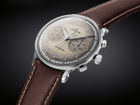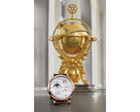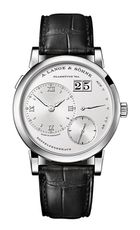Vorlage:In the news
| IN THE NEWS | ||
|---|---|---|
| News archive 2023 << News archive 2024 >> All news | ||
New accolades Glashütte, March 2016 The ZEITWERK MINUTE REPEATER was named Technical Star of the year in the Watchstars Awards 2015/2016. Within the scope of the Watch of the Year 2016 awards, Walter Lange received a prize for his lifework. Composed of 51 international watch experts, the jury of the Watchstars Awards 2015/2016 chose the ZEITWERK MINUTE REPEATER as the best watch in the Technical Stars category. The decision was made because the German brand had presented an outstanding reinterpretation of this fascinating complication, the jury said. The independent watch prize is awarded in five categories. Only jury members ...
Schramberg / Basel, March 2016 Junghans and cars enjoy a close connection dating back over 100 years. Inspired by this, the Meister Driver Chronoscope combines the charm of classic cars with a passion for mechanical timepieces. Time travel
Glashütte, March 2016 At the annual press conference of the Staatliche Kunstsammlungen Dresden (SKD) on 9 March in Dresden, SKD director Hartwig Fischer and Lange CEO Wilhelm Schmid announced the continuation of their partnership, which began in 2006, for another five years. The cultural partnership between the traditional watchmaker and the worldfamous museum association experienced another highlight last year in the form of the special exhibition “Simple and perfect – Saxony’s path into the world of international watchmaking”, which marked 200 years since Ferdinand Adolph Lange’s birth. The SKD’s 14 museums, including the Grünes Gewölbe (green vault), the Galerien Alte und Neue Meister (old and new masters’ galleries), the Porzellansammlung (porcelain collection) and the Mathematisch-Physikalische Salon, are some ...
Glashütte, February 2016 World time masterpiece from Glashütte Original wins coveted prize Honouring exceptional timepieces, newcomers and beloved classics alike, the “Golden Balance” is one of the most coveted awards in the watch industry. Glashütte Original's Senator Cosmopolite was awarded first prize in the premier category, “Watches over 25,000 Euros”, at a festive ceremony held last Thursday, February 25, 2016. The “Golden Balance” was awarded for the 18th time this year. A total of 354 different models
The new LANGE 1 in white gold is just around the corner Glashütte, February 2016 The LANGE 1 owes its recognition to the asymmetric dial design and the prominent Lange outsize date. It was inspired by the five-minute clock in the Dresden Semper Opera House, which, for 175 years, has been a hallmark of the world-famous operatic venue. Some ideas are so persuasive that they can survive catastrophes and retain their fascination even 175 years after they premiered. One of them is the five-minute clock in the Semper Opera House that displays the time digitally. Aloft over the stage, it indicates the time in an artistically framed double aperture: the hours in Roman numerals on the left, the minutes – in intervals of five – in Arabic numerals on the right. Every evening, the operagoers wait patiently for the minute display to switch from 55 to the blank white field, because the performances always begin at the top of the hour. When the Royal Court Theatre was inaugurated in 1841, this technical marvel was considered a sensation, and, for its inventor, Johann Christian Friedrich Gutkaes, it resulted in his appointment to court clockmaker. Together with his employee Ferdinand Adolph Lange, Gutkaes completed the exceptionally large tower clockwork with two counter-rotating wheels and ...
| ||




